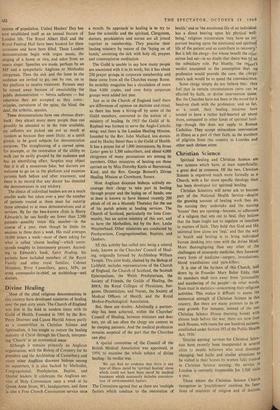Small wonder that many people who might be ex Pected
to regard the Socialists as champions of the underdog are sadly disillusioned and have turned to the Liberal Party, so despised by Mr. Dale, as
8 more truly representative of the under-
Privileged classes.—Yours faithfully, J. W. LUCAS 104 Dowanhill Street, Glasgow, W2 EDWARD YOUNG
SIR
1, ."---The correspondence of Edward Young (1683- i_165), eminent man of letters and rector of St. Mary's
°M Welwyn, Herts, for thirty-five years, is a re- m., arkable portrait of English society. Never have !nese letters been brought together, and many remain suinPublished. I am now intent on correcting this omis-
rt and would like to know of the existence of any letters still in private hands. I would be very grateful 1 hear . ear about their existence even to the most insig- !ant scraps and apparently inconsequential notes. r ours faithfully, HENRY PETTIT Professor of English Literature, 26 Carlyle Square, 5113University of Colorado
Theatre
You in Your Small Cor- ner. (Royal Court.)— Settled Out of Court. (Strand.) — This Year, Next Year. (Vaude- ville.)
You in Your Small Corner provided two triumphs at the Royal Court on Sunday. The
ALAN BRIEN first was Jeanne Hepple's, is on holiday who is undoubtedly the Court's greatestfind since Joan Plowright. She played a Cockney girl from Brixton who falls for, and struggles to keep, a West Indian student. When he's about to leave for his first term at Cambridge she gives him a tie as a parting present. It was not his fault that I neither saw him take it nor open it. As she stood there watching him, all the conflicting emotions of the situation rippled together through her whole being—the happiness of giving it him, the fear that he might not like it, the awkwardness and yet the closeness of the moment, the stillness and the turmoil. It would take pages to analyse all that she was projecting. Luckily Jeanne Hepple doesn't need to do so. She was giving a present to someone whom she loved and was afraid to lose, and that was enough. She was playing what she is—a creature as real as she is rare and as vital as all five vitamins.
The other triumph was that of John Bird, the director. The mechanics of his production were thrown into chaos by an elaborate set which, built for Cheltenham, was far too big for the Royal Court stage. But this didn't obscure the honesty and sensitivity of his touch. The play contains love-scenes which are as different from each other as Pompadour from Monroe (a society girl from Cambridge intervenes in the second act) but in each case the details of the production were exactly right. From the way the characters moved towards an embrace down to' the slightest movement of a hand on a back, every touch helped to reveal the different realities under the surface.
With a little rewriting a third triumph would be the author's—Barry Reckord. His play is in no sense a problem play. His lovers, she with her white skin, he with his place at the university, are constantly threatened by criss-cross meshes of class and colour, but the play remains essen- tially a love-story. And the author avoids all the obvious clichds, both in the attitudes of his characters and in their crisp dialogue. It is a measure of the success of the writing, direction and performance that Margery Withers, playing the girl's mother, could rattle through one of those 'Well, yes, she said to me, yes, so I said to her, I said . . .' speeches without there being the slightest hint of parody. Oddly enough (since the author is a West Indian) the Cockney scenes were the most successful ones—perhaps because
(FIPR)
the flamboyant West Indian speech and ges- tures, admirable in themselves, seemed exag- gerated and artificial beside the dry London wit. But author and director together could put this right.
The whole cast gallantly overcame their diffi- culties with the set, even though at times they had to jostle for space in a coffin-sized oblong. Lloyd Reckord had good moments in the very varied part of Dave, the West Indian, but often appeared self-conscious beside Miss Hepple. The Royal Court must surely give this play a public production—with virtually the same cast, the same director, and a less fussy set.
Vitamin Pill
By B AMBER GASCOIGNE














































 Previous page
Previous page